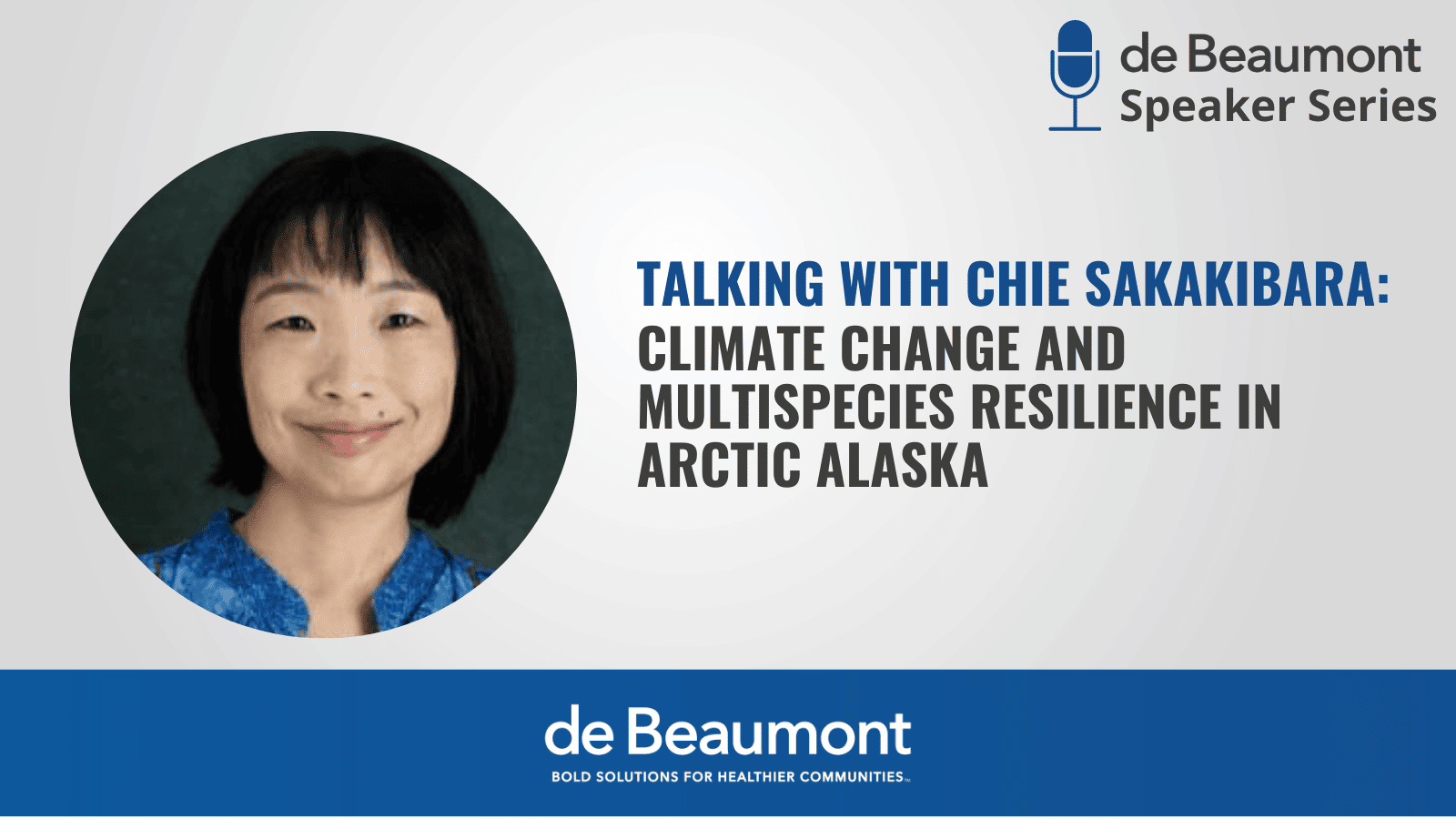The de Beaumont Foundation’s Speaker Series highlights leaders in public health practice, advocacy, policymaking, and other related fields.
Seventeen years ago, cultural geographer and environmental humanist Chie Sakakibara, PhD, MA, began her journey as a graduate student among the Indigenous Iñupiat community in Arctic Alaska. Now an associate professor of geography and Indigenous studies at Syracuse University, Sakakibara has documented these experiences in her book, Whale Snow: Iñupiat, Climate Change, and Multispecies Resilience in Arctic Alaska.
“This story tells how a marginalized population confronts environmental crisis by reaffirming their cultural identity through reinvigorating social customs, sovereignty politics, and cultural performances,” she told de Beaumont staff at a Speaker Series event. “I am in this privileged position as a storyteller. What I’m sharing with you is the stories, knowledge, and perspective so generously bestowed upon me by my community partners, so I see the community as my co-authors.”
Many Iñupiat call themselves “the People of the Whales,” illustrating a sacred and sustained relationship between human and non-human species in the Arctic environment. For Iñupiat, the bowhead whale is a means of sustenance, but it is also deeply revered in their cosmology. In its death, the bowhead whale gives the Iñupiat community a gift that is celebrated through sharing of the whale, and interspecies reciprocity embodied by performances with singing, dancing, and drumming. In this way, whaling is the core of the community that brings everyone and every element of life together.
Because the bowhead whale is central to Iñupiat culture and way of life, its current health and future well-being is paramount. However, global climate change poses an immense threat to both human and non-human species in Arctic Alaska. Higher temperatures have resulted in rising sea levels, loss of the Arctic sea ice, and coastal erosion. Climate change has also affected the migration patterns of the bowhead whales themselves — all of which make whaling more challenging.
It is not only the nutrients that the bowhead whale provides that makes the animal indispensable from the Iñupiat community. By giving itself to the people, the whale enables food sovereignty for Iñupiat. In doing so, the whale becomes a source of social unity and the foundation of community resilience for the People of the Whales. Without the bowhead whale, Iñupiat society would collapse, as Sakakibara heard over and over from her collaborators.
Members of Sakakibara’s adoptive Iñupiat family encouraged her to write about the connection between climate change and the human-whale relationship. However, they did not want the story to be one just of despair focusing on the vulnerability of Indigenous peoples. According to her Iñupiat family, “Native peoples are portrayed as if they are on the verge of disappearance because of climate change, but that’s not what’s happening. We’re getting only stronger at this time of crisis.” This statement firmly set the trajectory of her work with the community.
In writing Whale Snow, Sakakibara and her collaborators sought to tell a story of hope in the face of threats to their environment and community. Although mental health and well-being have suffered due to the effects of climate change, Iñupiat are leaning on one another through human-to-human and human-to-nonhuman relationships and embracing their traditions — “which are not frozen in time, but always flexible and elastic,” Sakakibara said — to cope with unprecedented socio-environmental challenges and crises.
“Depression has been a serious issue, but people also know that togetherness cultivates resilience,” helping them decrease rates of suicide, homicide, and substance abuse, especially among youth, Sakakibara said. “So that’s why they dance more. They sing more. They tell more stories about the disappearing homeland, which is the equivalent of the bowhead whale, as one of their creation stories shows.”
The pandemic has complicated gatherings, although a swift, early vaccination effort has allowed the Iñupiat community to cautiously enjoy festivities together again. In fact, Iñupiat were among the first to complete their vaccination process in 2021. “Given how severely Indigenous communities were affected all over North America and beyond, what we witnessed among Iñupiat people is a huge story of success that shows how great the community unity is,” Sakakibara said in July.
In November 2021, however, Alaska Native communities in rural Alaska are one of the most severely affected groups by COVID-19 in the United States. And recently, the North Slope Iñupiat community lost Reverend Roy Maloney Nageak, Sr., a whaling captain and community leader who was also Sakakibara’s adoptive father.
How does the community survive in a time of such loss and grief? “In the Anthropocene — the age of isolation, extinction, and extermination — seeking out multispecies relatedness is crucial as it keeps our social capacity relational and resilient,” Sakakibara said. “As climate, society, and human resilience are connected through whaling, entanglement with interspecies relations presents hope, defeating the elegiac narratives that portray the susceptibility of Indigenous peoples to disappearance.”
Education is another way that Iñupiat people are sustaining their culture and community, alongside partners like Sakakibara. As an individual of Indigenous heritage, Sakakibara is committed to decolonizing community-based service learning and fostering reciprocal relationships with the people at the focus of research. Whale Snow represents the promise that she made to her Iñupiat family to tell their stories and keep fostering a meaningful relationship with the community as a scholar, educator, and individual.





